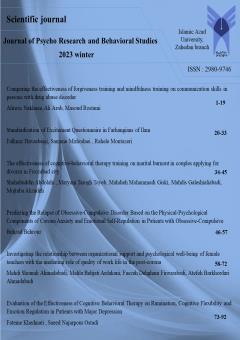Predicting the Relapse of Obsessive-Compulsive Disorder Based on the Physical-Psychological Components of Corona Anxiety and Emotional Self-Regulation in Patients with Obsessive-Compulsive Disorder
Subject Areas : Psychology
1 - razi univrsity
Keywords: obsessional symptoms, corona anxiety, emotional self-regulation.,
Abstract :
Obsessive illness is one of the severe problems and disorders, the cause of which is challenging to recognize and treat. Therefore, the research was conducted with the aim of predicting the relapse of obsessive-compulsive disorder based on the physical-psychological components of corona anxiety and emotional self-regulation in patients with obsessive-compulsive disorder. The research method was descriptive-correlation. Among the women suffering from obsessive compulsive disorder who referred to Parham Clinic in Kermanshah in 2023, 200 people were selected using the available sampling method and obsessive-compulsive questionnaire (Hodgson and Rachman, 1977), corona anxiety (Alipour et al., 2018) and emotional self-regulation (Gross and John, 2003) they completed. Data analysis was done with the methods of descriptive statistics, Pearson correlation coefficient and multivariate regression with the help of SPSS version 26 statistical software. The results showed that corona anxiety (r=0.29 and p=0.014) and its components have a positive and significant correlation with the recurrence of obsessive-compulsive symptoms (p<0.05). Also, emotional self-regulation (r=-0.48 and p=0.018) and its dimensions were able to negatively and significantly predict the recurrence of obsessive-compulsive symptoms. Regression analysis using the simultaneous method also showed that predictor variables together predicted 31% of the variance of recurrence of obsessive-compulsive symptoms. Considering these results, it seems that by improving emotional self-regulation and controlling the anxiety of Corona, it is possible to reduce the recurrence of obsessive-compulsive symptoms in these patients.


